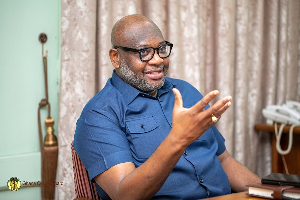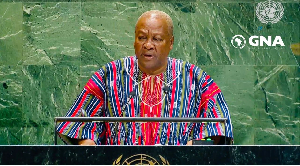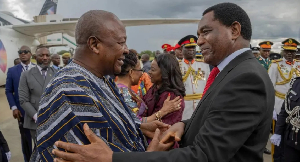Business News of Wednesday, 13 February 2019
Source: GNA
Africa needs industrialization to drive its development transformation - Alan Kyerematen
Mr. Alan John Kwadwo Kyerematen, the Minister of Trade and Industry, says Africa must pursue industrialization as a strategic agenda towards transformation to promote economic development for her people.
He said Africa, therefore, needed to tie its industrialization agenda to training and building the skills of the people, as it builds its infrastructure to help push that agenda.
Mr. Kyerematen said there was, therefore, the need to identify the roles of governments and the private sector towards the developmental transformation of the Continent.
He said governments should also make deliberate attempts in building strategic partnerships with Germany to aid the transformation agenda.
Mr. Kyeremanten was speaking as a panelist at the Third German-Africa Business Summit (GABS) underway in Accra.
The GABS is expected to create a broad overview of current developments, long-term trends and specific opportunities and risks within individual markets.
He said Africa needed to make a strategic decision about its development path since most developed countries first showed clarity about where they wanted to go.
“Now I believe that if we want to transform Africa then we want to determine the type of skills that is required for this transformation, and on the clarity of what is required, I will want to vote for industrialization,” Mr. Kyerematen said.
“Because once we decide that Africa’s path towards transformation is through industrialization then the skills development agenda will be tied within that context.”
He said in Ghana, the Government had identified the auto industry as one of the strategic pillars of growth and so it was working to develop skills in that sector, which informs the educational institutions about the content and the quality of skills that was required.
Mr. Kyerematen said Africa could do same by identifying and agreeing on areas it wanted to priorities, and then look at government’s role in terms of skills development and the role of the private sector, so the two could work together to push that agenda.
He also supported other panelists on the need for Africa to adopt digitization, technology and innovation, critical tools owned by countries like Germany and others to leverage on her development.
Dr. Ibrahim Mohammed Awal, the Minister of Business Development, said Africa also needed to provide training in the area of Technical and Vocational Education by redefining the schools’ curriculum to enable students from primary to tertiary levels acquire such skills to make them operate efficiently.
Mr. Valentin Ela Maye, the Vice Minister of Finance, Economics and Planning, Republic of Equatorial Guinea, said Africa needed to borrow the tools of the developed countries to unearth its numerous potentials for economic transformation.
Ms. Isabella Groegor-Cechowicz, the Global General Manager of Public Services, SAP SE, advised Africa to stick to education and digitization as critical tools for transformation.
Mr. Gerd Muller, the Federal Minister of Economic Cooperation and Development, Germany, said his government would contribute significantly to fostering business partnerships between Germany and African partner countries.
“We have, therefore, created an investment fund of one billion euros to mitigate the risks for German companies that invest in Africa and help African small and medium-sized enterprises to grow”.
All the panelists agreed that Africa needed to add value to its raw materials so it would be able to become an exporter of refined materials while paying critical attention to the private sector.
The Sub-Saharan Africa Initiative of German Business (SAFRI) is hosting the GABS, being attended by more than 500 individuals and businesses from Germany and Africa.
The summit would also provide an opportunity to keep up existing business contacts and network with new partners.












